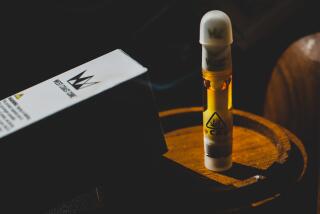Widely Used Hospital Disinfectant Fails Tests, FDA Says : Medicine: Federal agencies act to remove cold Sporicidin solution as a health ‘danger.’ Company says EPA recently called the product effective.
- Share via
WASHINGTON — Federal health officials Friday began steps to remove a widely used disinfectant from the market and warned hospitals, dentists and other medical practitioners to stop using the product.
“This stuff doesn’t work,” said Dr. David A. Kessler, commissioner of the Food and Drug Administration, one of three agencies involved in the action. “It shouldn’t be used.”
A series of actions was initiated against Sporicidin Cold Sterilizing Solution and four other similar products manufactured by Sporicidin International of Rockville, Md. The products make up an estimated 25% of the market.
Sporicidin Cold Sterilizing Solution is used to sterilize and disinfect medical instruments and other equipment and fiber-optics used in endoscopic surgery, anesthesiology and respiratory therapy.
The FDA said it failed effectiveness tests and called it “a danger to health.”
Dr. Robert Schattner, owner of the company, said he would temporarily comply with the agencies’ demands but intended to “vigorously contest these actions.” He said the product “has a long history of confirmatory testing,” including tests performed by the Environmental Protection Agency. The company cited a 1990 EPA letter noting the product proved “effective for the uses claimed on the most recently approved product label. . . . “
The FDA, the EPA and the Federal Trade Commission, which all share authority in the case, stressed there was no evidence that consumers have been harmed by the product but said the agencies acted because it “may pose a risk to health.”
Hospital-acquired infections have long been a major health problem in the medical community. Sterilization agents used in medical facilities “are supposed to protect patients from contact with harmful microorganisms,” Kessler said.
“We will not tolerate products that would permit the transmission of disease from one patient to another,” Kessler added.
Moreover, during the past year, there has been increasing attention on infection control procedures after the apparent transmission of the human immunodeficiency virus, which causes AIDS, by a Florida dentist to five of his patients. The first patient to be identified, Kimberly Bergalis, died this week from AIDS.
Evidence in that case points increasingly to a breakdown in infection control procedures, and federal health officials, medical organizations and other groups have urged strict adherence to so-called “universal precautions” to prevent the transmission of AIDS, hepatitis B and other diseases.
The FDA emphasized, however, that the tests performed on the Sporicidin product--that showed it ineffective--are designed to ensure that the agents will kill the most resistant organisms.
“Failure to pass this test does not mean that the product will not kill much more fragile organisms, such as HIV,” the FDA said.
Schattner, of the company, insisted that “not one case of nosocomial (hospital-acquired) infection has been reported in 14 years of hospital operating room use,” adding: “This is an unsurpassed testimonial for any product.”
He said he would fight the allegations and was confident that “Sporicidin will ultimately be vindicated.” He said the company’s “greatest regret” was “the inconvenience that will be created to our many dedicated users throughout the world. . . . “
But EPA Administrator William K. Reilly said “we are urging health care providers to use alternative products for sterilizing or high-level disinfecting.”
The agencies began a complicated series of steps Friday to begin removing the cold sterilizing solution from the market after the firm failed to heed repeated warnings from the FDA.
At the same time, the U.S. Attorney’s offices in Baltimore and Nashville filed legal actions to seize the five sterilizing products made by the company, including the cold sterilizing solution, “because they are adulterated and misbranded.”
The products are distributed from the company’s headquarters in Rockville, a warehouse in Baltimore and a contract facility in Jonesborough, Tenn.
The agencies also called upon the company to voluntarily recall all stocks of the cold sterilizing solution from hospitals and other outlets, and EPA said it was prepared to “order a stop sale and use of this . . . product wherever located throughout the nation.”
The product is a registered pesticide, which is why EPA has jurisdiction; it is also considered a medical device, which is regulated by the FDA. The FTC is involved because of advertising claims made by the company.
The active ingredient in the cold solution is glutaraldehyde, the most widely used chemical class of liquid sterilants, EPA said. Health care providers use Sporicidin Cold Sterilizing Solution and other chemical sterilants to treat medical instruments they cannot otherwise sterilize with heat, such as fiber-optic endoscopes, EPA said.
In addition to hospitals, such agents are also used in emergency rooms, nursing homes, ambulances, medical offices, dental clinics and veterinary clinics.
More to Read
Sign up for Essential California
The most important California stories and recommendations in your inbox every morning.
You may occasionally receive promotional content from the Los Angeles Times.













